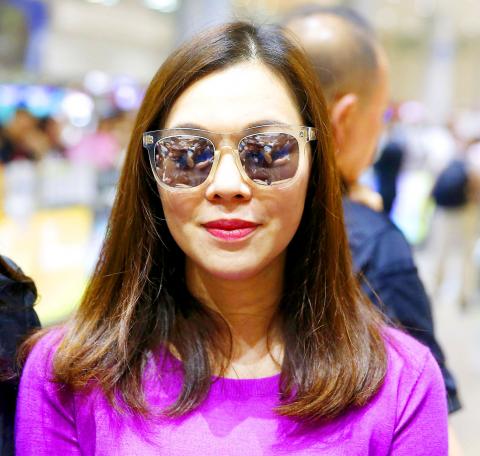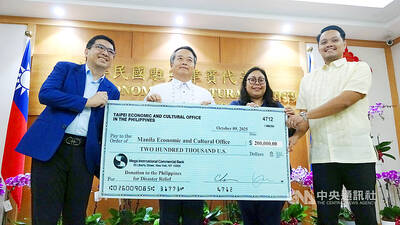Hon Hai Precision Industry (鴻海集團) chairman Terry Gou (郭台銘) yesterday apologized after his dismissal of his wife’s opposition to his presidential bid with the remark “the harem should not meddle in politics” drew criticism.
“I would like to solemnly apologize to those who feel offended [by what I said]. I have used an inappropriate metaphor. I would like to apologize for that,” he said.
Gou on Wednesday last week made a surprise announcement that he plans to run for president after declaring the sea goddess Matsu urged him to do so.

Photo: Chu Pei-hsiung, Taipei Times
The plain-speaking 69-year-old tycoon is seeking the nomination of the Chinese Nationalist Party (KMT) for the January next year polls.
However, Gou’s wife, Delia Tseng (曾馨瑩), appeared to be none too happy with his foray into politics.
In a series of TV interviews aired on Thursday, Gou said Tseng had left home after he made the announcement.
“My biggest challenge now is my wife who has already left home,” he told local channel ECB.
In response to media queries for his reaction to his wife’s departure, Gou was quoted by local Chinese-language media as saying that “the harem should not meddle in politics.”
Those comments sparked a backlash on social media.
“Who does chairman Gou think he is? If he wants to be an emperor he should go to China to replace [Chinese President] Xi Jinping (習近平),” feminist campaigner and Social Democratic Party convener Fan Yun (范雲) wrote on Facebook.
“When you wanted to run, you said a woman [Matsu] asked you to, now you are telling women not to meddle in politics,” she added, addressing Gou.
Some Internet users offended by the remarks urged Gou to withdraw from the presidential race.
“How many women are in chairman Gou’s harem? He wants to be an emperor in the Republic of China. He should withdraw,” one post read.
TVBS has reported that Tseng yesterday returned to Taiwan from a trip to Japan, while SETV quoted Gou as saying that he would be home welcoming her back.
Gou later said that Tseng had returned home.
Known for his aggressive dealmaking and often mercurial public appearances, Gou has been snapping up investments from Japan to India in a bid to diversify from electronics assembly.
The bulk of Gou’s investments are in China, employing more than 1 million workers in the country where cheap labor helped fuel his company’s meteoric rise.
Gou was born in 1950 in Taipei to parents who had fled the Chinese Communist Party’s victory in the Chinese Civil War.
He studied shipping management in college while supporting himself with part-time jobs.
He started his business in 1974 making television parts with an investment of NT$100,000 from his mother and later began producing computer parts — eventually growing to become the world’s biggest contract electronics maker.
Additional reporting by staff writer

A drunk woman was sexually assaulted inside a crowded concourse of Taipei Railway Station on Thursday last week before a foreign tourist notified police, leading to calls for better education on bystander intervention and review of security infrastructure. The man, surnamed Chiu (邱), was taken into custody on charges of sexual assault, taking advantage of the woman’s condition and public indecency. Police discovered that Chiu was a fugitive with prior convictions for vehicle theft. He has been taken into custody and is to complete his unserved six-month sentence, police said. On Thursday last week, Chiu was seen wearing a white

The Taoyuan Flight Attendants’ Union yesterday vowed to protest at the EVA Air Marathon on Sunday next week should EVA Airway Corp’s management continue to ignore the union’s petition to change rules on employees’ leave of absence system, after a flight attendant reportedly died after working on a long-haul flight while ill. The case has generated public discussion over whether taking personal or sick leave should affect a worker’s performance review. Several union members yesterday protested at the Legislative Yuan, holding white flowers and placards, while shouting: “Life is priceless; requesting leave is not a crime.” “The union is scheduled to meet with

‘UNITED FRONT’ RHETORIC: China’s TAO also plans to hold weekly, instead of biweekly, news conferences because it wants to control the cross-strait discourse, an expert said China’s plan to expand its single-entry visa-on-arrival service to Taiwanese would be of limited interest to Taiwanese and is a feeble attempt by Chinese administrators to demonstrate that they are doing something, the Mainland Affairs Council said yesterday. China’s Taiwan Affairs Office (TAO) spokesman Chen Binhua (陳斌華) said the program aims to facilitate travel to China for Taiwanese compatriots, regardless of whether they are arriving via direct flights or are entering mainland China through Hong Kong, Macau or other countries, and they would be able to apply for a single-entry visa-on-arrival at all eligible entry points in China. The policy aims

The government yesterday donated US$200,000 to the Philippines to support post-earthquake relief and recovery efforts, following a powerful magnitude 6.9 quake that struck Cebu Province late last month, killing at least 72 people and injuring 559 others. The donation was presented earlier yesterday by Representative to the Philippines Wallace Chow (周民淦) to Cherbett Maralit, deputy resident representative of the Manila Economic and Cultural Office, at Taiwan’s representative office in Manila. In his remarks, Chow expressed concern for those affected by the magnitude 6.9 earthquake that struck the central Philippines on the night of Sept. 30. "We sincerely hope for the earliest possible